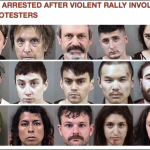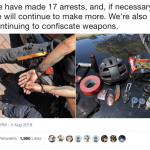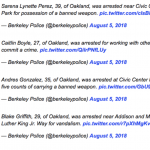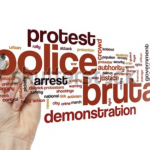When a police car drives by, everyone elicits a reaction. From beads of sweat and avoiding eye contact even if no crime has been committed, to feeling more safe walking home alone at night knowing that there are a couple squad cars patrolling campus. We all have an instant response whether it is anxiety filled or creates less anxiety.
Bottom line and either way, we have police to make sure the public is “safe”. I quote safe because constantly, many lines are blurred and crossed when it comes to racial discrimination in the legal systems and how you are safer nine times out of ten depending on how white/white passing you are.
In Berkley at the beginning of August, police officers on the Berkley Police Department arrested anti-facist activists and not only charged them with protesting and other charges (ex. A poster with a stick to protest with was considered a weapon) but posted their mugshots on their Twitter knowing it would be seen nationally.
Although this situation was not directly based on race, it was based on beliefs and many were centered on protesting police brutally, supporting the Black Lives Matter movement, and other more prominently liberal stances.
The police of Berkley stated in emails that they wanted to try to get as many likes and tweets and they could on protestors mugshots they posted (before being formally charged) and wanted to create a “counter-narrative of dialogue.”
Veena Dubal was interviewed about this situation in The Guardian and she stated, “If the prevailing narrative is these right wing, white supremacist rallies should be stopped, and we don’t want them in the city, then the ‘counter-narrative’ is we do want them in our city, and the counter-protesters are the problem.” She is basically condemning the actions of the police department, who had intense protesting between the alt-right movement and the anti-facist activists.
It is imperative to see that the issue of this is not whether these activists were creating an unsafe environment for the public (which sometimes is skewed on damage/violence based on media outlet), it is about how the police are meant to protect the citizens of their county. Not to embarrass them, tweet about them, silence them and potentially create a threatening living environment for them.
Many across the nation were deeply ‘disturbed’ by this situation as well. These humans, not some statistic, were not charged yet when their pictures went up on Twitter and treating them like criminals basically makes them criminals.
The Berkeley Police acted without carelessly, knowing it would also create a nationally viewed response and that these activists lives might be harmed, threatened, and altered forever based on these tweets.
So what happens now? Whenever we protest for a cause we believe is worth the fight and stance, will we be humiliated for it by those who swore an oath to protect and serve?
What is the goal here.
Police should not be tweeting on the job and activists should not be having their careers ruined for protesting when many of the best changes we have seen in the past 100 years has come from standing up for what is right.
Would the women’s suffrage movement have changed so many lives if we had Twitter today? Would Martin Luther King Jr. have had a peace rally, or would the “counter-narrative” have warped the story to make it look like justice was done.
The next time you are on campus and see a cop car, just make sure they aren’t tweeting and driving.





1 comment for “To Tweet or Delete: Berkeley Police Edition”